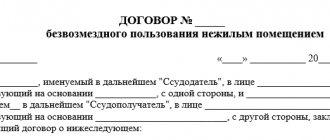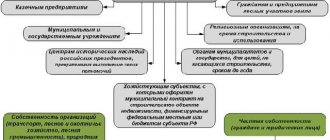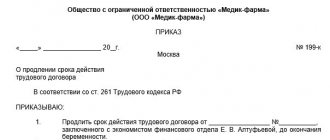“Civil Code of the Russian Federation (Part Two)” dated January 26, 1996 N 14-FZ (as amended on December 27, 2019, as amended on April 28, 2020) Civil Code of the Russian Federation Article 689. Agreement for free use
1. Under an agreement for gratuitous use (loan agreement), one party (the lender) undertakes to transfer or transfers an item for gratuitous temporary use to the other party (borrower), and the latter undertakes to return the same item in the condition in which it received it, taking into account normal wear and tear or in the condition stipulated by the contract.
2. The rules provided for in Article 607, paragraph 1 and paragraph one of paragraph 2 of Article 610, paragraphs 1 and 3 of Article 615, paragraph 2 of Article 621, paragraphs 1 and 3 of Article 623 of this Code are respectively applied to a contract for gratuitous use.
3. The rules provided for in Article 609 of this Code also apply to an agreement for the gratuitous use (loan) of an object of cultural heritage.
What is an “Agreement for the free use of residential premises”?
In Art. 689 of the Civil Code of the Russian Federation provides for the possibility of drawing up an agreement for the use of a specific thing free of charge. Under the terms of the agreement, one party provides the other with living space for free use. According to the norms of the Civil Code of the Russian Federation, the parties to the transaction are:
- lender. He is the one who transfers the premises for use;
- the borrower is the receiving party.
The first participant undertakes to transfer the property without making demands for payment for use for a specified period . The second party has responsibilities:
- keep the premises in proper condition;
- pay current expenses, including utilities.
Moreover, each participant has rights that are specified in the text of the agreement.
In what cases is an agreement concluded?
An agreement to provide housing free of charge can be concluded with any person. The law does not establish a list of persons who have the right to draw up and sign such a document. However, in practice, such a transaction can often be concluded in certain situations:
- residence of a relative. If the lender is ready to provide living space free of charge, but wants to protect the housing and himself from surprises, it is advisable to draw up such a document;
- use of the premises by friends, acquaintances, etc.
However, the document is also drawn up with other persons if the owner of the premises agrees to the conditions.
Have a question or need legal help? Take advantage of a free consultation:
Free legal advice by phone:
8 (Moscow and Moscow Region) 8 (St. Petersburg and Leningrad Region) 8 (Regions of the Russian Federation)
Mandatory terms of the contract
An essential condition of the agreement is an indication of the subject. This means that the premises provided under the agreement must be clearly characterized by indicating the following data:
- address;
- technical and cadastral data in accordance with the documents;
- features, area, etc.
The remaining parameters are not essential, but are often specified in the contract.
Terms of the contract
The text of the document should indicate the period for which it is concluded. In the case of an agreement for the gratuitous use of living space, the rules for determining the period are similar to the rules established for a rental agreement .
Rights and obligations of the parties
A separate part of the agreement is a description of the rights and obligations of the participants. According to Art. 691 of the Civil Code of the Russian Federation, the lender transfers the object to the borrower for use. In addition, all additional things or objects must be transferred, without which it is impossible to use the main subject of the agreement.
The lender has a number of rights, including receiving the home back in good condition within the agreed period.
The borrower undertakes to pay for capital and current repairs, as well as other payments. At the same time, he has the right to use the premises within the framework of the agreement.
Additional rights and obligations are specified in the text of the specific agreement.
Reasons for termination of the contract
The agreement is terminated for a number of reasons:
- refusal of the transaction under Art. 699 of the Civil Code of the Russian Federation with a month’s notice to the second participant;
- early termination under Art. 698 Civil Code of Russia;
- termination under Art. 701 Civil Code of the Russian Federation.
In the first case, each of the participants has the right to withdraw from the agreement at any time, having notified the other in advance.
In the second case, if one of the parties fails to fulfill the terms of the agreement, early termination of the agreement is possible.
In the event of the death of the borrower, the contract is terminated within the meaning of Art. 701 of the Civil Code of Russia.
Features of the agreement
Such an agreement is also called a loan. Both terms can be used. According to it, one individual - called the Lender - transfers to another - the Borrower - any thing for temporary use without charging a fee for it. That is, free of charge. The list of such things is huge: from the already mentioned drill to an entire factory. The main condition is the non-consumability of the transferred item. In other words, so that the latter does not change its properties and does not disappear during use.
Thus, food products, gasoline and other fuels and lubricants, semi-finished products and the like are not eligible for loans.
The lender is either the owner of the thing being transferred or his authorized representative. According to the law, the owner (proprietor) of a thing (property) has the right to dispose of it at his own discretion: put it up for sale, donate it, and, among other things, transfer it to another individual for free use. Any legally capable individual can act as a borrower. The main difference between this agreement and others is the gratuitousness of the transaction itself, where the owner does not receive any material preferences.
So, as mentioned above, the lender transfers a specific thing to the borrower free of charge and temporarily, and the latter undertakes to return it in the same condition (taking into account reasonable wear and tear).
If the agreement does not mention gratuitousness, then, by default, it is considered that a lease agreement (lease agreement) has been concluded.
Early dissolution
One of the options for terminating the relationship between the lender and the borrower is early termination of the contract. This is possible for one of several reasons :
- use of residential premises for other purposes;
- deterioration of housing;
- transfer of premises for use to another person without the consent of the lender;
- detection of rights of third parties to an object that were not notified by the lender.
As a result, an agreement on the transfer of an object for free use can be concluded by the parties independently. However, you should adhere to a sample or standard form, and also take into account legal requirements.
Share post with friends
Legal regulation
The concept of a contract for gratuitous use is given in Article 689 of the Civil Code, and the concept is also given to the parties to such obligations: the lender and the borrower. The rules and conditions for its preparation are specified in Chapter 36 of the Civil Code of the Russian Federation.
The rights and obligations of contractual relations, when premises are transferred for use without charging a fee, are stipulated in Article 30 of the Housing Code of the Russian Federation. It also establishes the owner’s obligation to monitor the condition and maintenance of housing in proper condition, observing the rules of use and not violating the interests of neighbors.
There are two grounds for providing housing under a free use agreement:
1.Based on regulatory documents for certain categories of citizens.
Such premises are allocated to socially vulnerable categories from the specialized housing stock. Thus, citizens who fall into a certain group according to a normative act approved by regional authorities can apply for an apartment or part of it. These could be, for example:
- orphans;
- disabled people and families with disabled children;
- senior citizens who have lived in the region for a certain period of time;
- large families, etc.
2.In a contractual manner, having reached an agreement between the parties.
In this case, the owner of the living space can temporarily transfer it free of charge to any person, for example, a relative or friend. Such an owner can also be a legal entity that provides premises to its employee.
A contract for gratuitous use has a significant difference from a contract for social rental of residential premises, since in the first case the borrower is exempt from paying fees for its use. However, it is necessary to pay attention to the clauses of the agreement. Only living in an apartment or house can be free, but not the burden of paying for utilities and other payments.
Termination of an agreement
In some situations it may be necessary to terminate the contract early. For this:
- if the contract specifies a validity period, then the right of out-of-court termination belongs to the tenant, and the owner of the apartment will be forced to terminate the deal through the court;
- if the validity period is not specified, then you can unilaterally terminate the contract without court by sending a notice to the other party one month in advance;
- Regardless of the term of the contract, the parties can terminate the relationship by mutual consent.
There are grounds for early termination:
| For the owner of the premises | For residents |
| · misuse of a residential property (for industrial, commercial or other activities); · significant deterioration of the apartment’s parameters when compared with the original state according to the acceptance certificate; · transfer of property for use to third parties; · failure to fulfill obligations to pay utility bills on time. | · significant deficiencies hidden at the time of signing the agreement and act were identified; · unsuitability of the apartment for habitation as a result of force majeure circumstances; · presentation of legal rights by third parties to dispose of this property. |
Responsibility of the owner of the premises when transferring an apartment for free use
In accordance with Art. 693 of the Civil Code of the Russian Federation, the lender is responsible for failure to provide information about the presence of defects in the property transferred to the borrower under a gratuitous use agreement. If such deficiencies are discovered, the borrower has the right to demand from the owner:
- free elimination of deficiencies;
- reimbursement of expenses incurred by the borrower in eliminating these shortcomings;
- early termination of the contract for gratuitous use with compensation for actual damage incurred.
The owner of the apartment (lender) is not responsible for shortcomings that occurred and about which the borrower was informed when concluding the agreement. If the borrower is ready to eliminate the deficiencies of the residential premises on his own at the expense of the owner, if he agrees, the borrower must be officially notified of this possibility (Clause 3 of Article 693 of the Civil Code of the Russian Federation). If the defects that have arisen in the residential premises are irreparable, that is, they are the result of uneven shrinkage of the foundation, the formation of cracks and deformations in the supporting structures and other significant deficiencies that threaten the life and health of the residents, the borrower has the right to terminate the agreement for gratuitous use unilaterally.
FAQ
Next, we will look at frequently asked questions that owners of residential premises and future residents ask in connection with free rentals.
Do I need to file a return and pay tax?
On the part of the homeowner, the answer is clear - there is no need to file a declaration and pay tax, since there is no income from renting out the apartment. However, residents may have questions. Receipt of residential space for rent free of charge is recognized as receipt of non-operating income on the side of the borrower-organization. This must be remembered when calculating income tax and VAT.
Individuals living under a gratuitous rental agreement do not have to pay tax in this case, since they are not payers of income tax and VAT.
Free rental of a room in an apartment
You can arrange a free rental not only for an entire apartment, but also for a room. The key point in this case is to record on paper exactly which room is being transferred, because it does not have a separate address and cadastral number.
Attention! To hire free of charge, just make a copy of the apartment plan and show the room you are looking for in color or shading. The agreement must indicate the footage of the room and state that the required room is highlighted on the apartment plan by shading or color.
How is free hiring arranged?
The use of residential premises is formalized by an appropriate contract, and the procedure is similar to a paid rental agreement. Once the parties have agreed on a future transaction, they need to:
- Inspect the living space, record the state of repairs, the availability of equipment, and indicators of utility meters.
- Draw up a free housing rental agreement, enter essential conditions into the form and sign.
- Sometimes an acceptance certificate is additionally drawn up in addition to the contract. This is not necessary if the agreement contains a note that the agreement simultaneously acts as a transfer document.
Attention! Certification of the contract by a notary is not required. Such agreements are also not subject to registration in Rosreestr, with the exception of the free rental of a cultural heritage object - under Art. 609 of the Civil Code of the Russian Federation.
Thus, for the transaction to take place, it is enough to sign a contract for the free rental of residential premises in simple written form and determine the procedure for transferring housing for use to the tenant.
Agreement extension
The contract should specify the period for renting housing free of charge. This is convenient for both parties, since each has an idea of when the agreement will end. However, the absence of a specific period plays into the hands of the owner of the premises, because in this case he can terminate the agreement pre-trial unilaterally - under Art. 699 Civil Code of the Russian Federation.
When the expiration date expires, you have several options:
- departure of residents and termination of the contract due to expiration;
- extension through the conclusion of an additional agreement to the contract;
- automatic extension, if provided for in the text of the contract;
- concluding a new contract with a new term - the deal, as it were, begins to flow anew.
If the parties do nothing and, after the expiration of the term, simply continue to comply with the agreement, then the agreement is extended for an indefinite period. The same situation occurs if the agreement period was not initially specified.
The relevant rental provisions apply to the extension of a contract for the free rental of residential premises. We also wrote about this in more detail in the article posted here.






